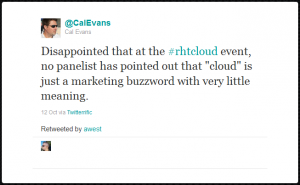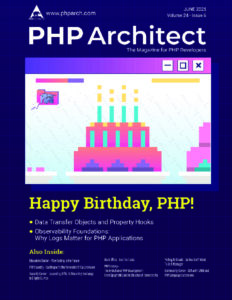What is “the Cloud”
 Recently, I attended a panel of local business executives discussing “the Cloud”. Overall, it was an interesting discussion. Since they all managed what we would consider “Enterprise Scale” operations, it was a different viewpoint for me as I spend much of my time talking to smaller scale operations or start-ups.
Recently, I attended a panel of local business executives discussing “the Cloud”. Overall, it was an interesting discussion. Since they all managed what we would consider “Enterprise Scale” operations, it was a different viewpoint for me as I spend much of my time talking to smaller scale operations or start-ups.
As the discussion played out, though, it became clear that “the Cloud” meant something different to each of them. This is my problem with the term and why I feel it has become so meaningless as to be a joke in the development community (the term, not the myriad of concepts it has come to represent). For many of the developers I know, the term “the Cloud” is only useful as the butt of a joke or as a drinking game as we saw at ZendCon ’10. The problem is, too many vendors say “the Cloud” when they mean “my services”, and a lot of time, they also mean “not your services”.
Wikipedia has a great page on “Cloud Computing” which is what a lot of – but not all – people mean when they say “the Cloud”. Here’s a short quote that explains where the term actually came from, when it really meant something.
The actual term “cloud” borrows from telephony in that telecommunications companies, who until the 1990s offered primarily dedicated point-to-point data circuits, began offering Virtual Private Network (VPN) services with comparable quality of service but at a much lower cost. By switching traffic to balance utilization as they saw fit, they were able to utilize their overall network bandwidth more effectively. The cloud symbol was used to denote the demarcation point between that which was the responsibility of the provider and that which was the responsibility of the user. Cloud computing extends this boundary to cover servers as well as the network infrastructure
In its most recent incarnation, “the Cloud” has come to mean a combination of distributed computing and virtualization that allows companies to rent the right amount of computing power they need for the moment. In this sense, “the Cloud” is a much more efficient method of allocating computing resources as a company can spin up or down machines almost real-time. From every aspect, economical to ecological, this is better than having to keep hardware warm in case you see a spike.
Distributed virtual computing also encompasses API vendors like Mashery. When you use an API, you are distributing your computing to the servers run by the API vendor. APIs – whether used to fetch data, transform data or manage other services – are an important part of “the Cloud” but lucky for us, they fit nicely into the new definition of distributed virtual computing.
The same goes for any ?aaS vendor (P, S, I, D, etc.). Since these are all part of “the Cloud”, they should be included in any definition. Luckily, all of these fit nicely as distributed virtual computing. As with APIs, any time you are using someone else’s CPU to do your work, you are doing distributing computing, virtual or not. Maybe we just need to narrow the wording down a bit to “distributed computing” because as cool as it is, “virtual” is not necessary to be “the Cloud”.
So now we reach the heat of the matter, what developers refer to as “the Cloud” is really distributed computing. Since the term “the Cloud” really belongs to the Telecommunications industry and is very vague and nondescript, we really should return it to them. What we need to start saying is “distributed computing”. When vendors start hawking services as being “the Cloud” or “cloud-based” and they aren’t part of the distributed computing definition, we really need to call shenanigans.
Words mean things, we need to stop redefining them because it’s convenient or to make our products look better. Read more in the cloud issue of php|architect. 🙂




Leave a comment
Use the form below to leave a comment: